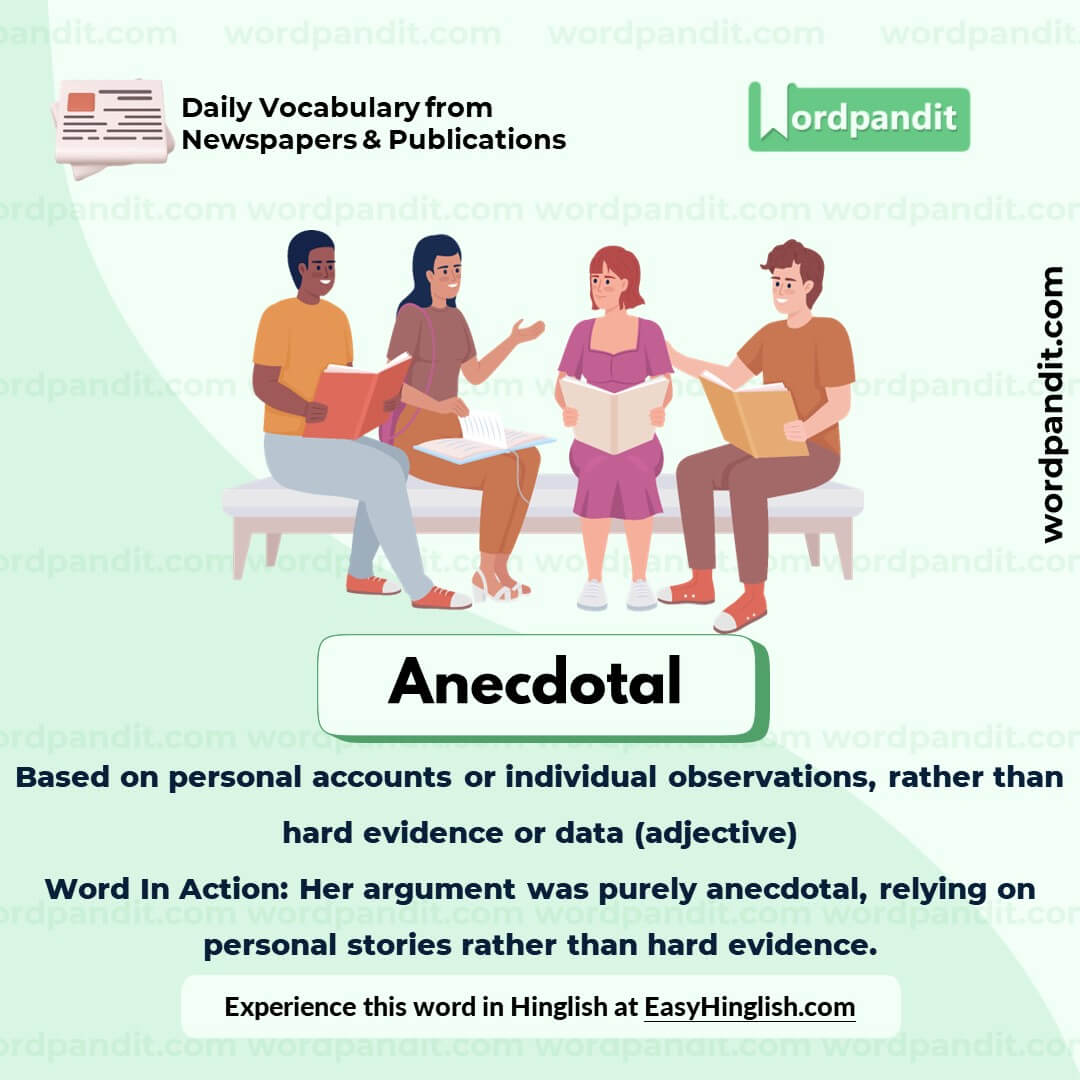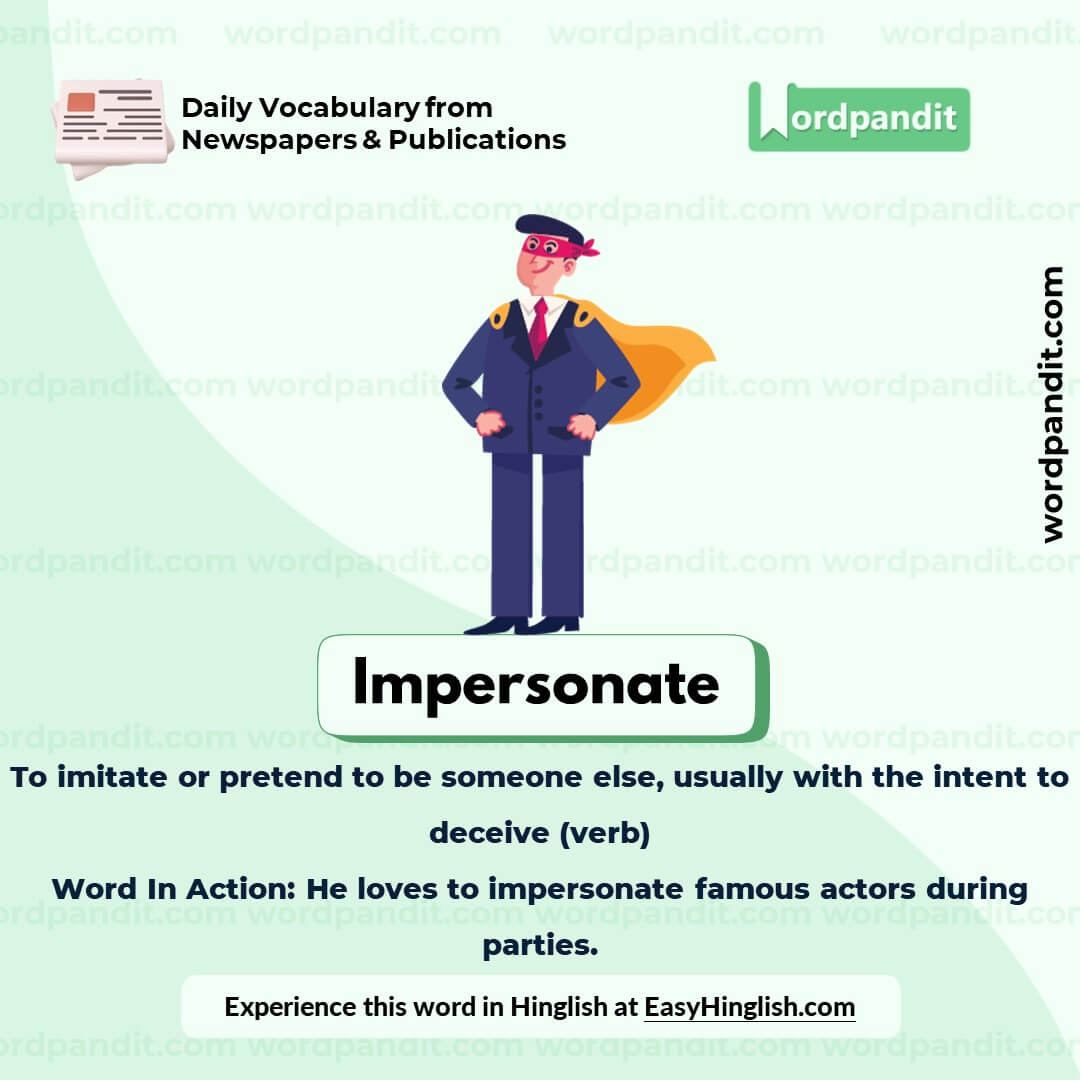Daily Vocabulary from Indian Newspapers and Publications
Welcome to Wordpandit’s Indian Vocabulary Hub
At Wordpandit, we understand the importance of staying rooted in the local context while expanding your language skills. This section focuses on enriching your vocabulary with words and phrases drawn from India’s leading newspapers and publications, ensuring you're learning vocabulary that is practical, relevant, and uniquely Indian.
Why Indian Sources Matter
We believe that the best way to master any language is by immersing yourself in local content. That’s why we carefully curate vocabulary from top Indian publications, including:
- The Hindu
- The Times of India
- The Economic Times
- Hindustan Times
- Live Mint
- The Indian Express
- And many others...
Stay Updated, Stay Relevant
With daily updates from Indian news sources, you’ll be consistently learning words that reflect the trends and shifts in Indian society and culture. Our focus is to provide vocabulary that enhances your understanding of the language in an Indian context.
How Wordpandit Supports Your Goals
Whether you’re preparing for exams, aiming to improve your professional communication, or simply want to stay connected with the latest Indian vocabulary, Wordpandit is here to guide you every step of the way.
Learn with a Practical Approach
Our interactive learning methodology includes real-world examples, engaging activities, and context-specific usage to ensure that every word becomes part of your active vocabulary.
Dive into Indian Vocabulary Today!
Why Choose Wordpandit?
Practical Learning: Focus on words you'll actually encounter in real-world reading, enhancing your comprehension and communication skills.
Diverse Content: From current affairs to scientific breakthroughs, our varied sources expose you to vocabulary across multiple domains.
Effortless Integration: Make Wordpandit a part of your daily routine. Just a few minutes each day can significantly boost your lexicon over time.
Your Path to Vocabulary Mastery
- Visit our Daily Vocabulary section regularly
- Explore new words and their usage in context
- Practice incorporating these words into your own writing and speech
- Track your progress as your vocabulary expands
Start Your Journey Today
Embark on your vocabulary enhancement journey with Wordpandit. By consistently engaging with our daily posts, you'll build a robust vocabulary that serves you well in academic, professional, and personal contexts.
Remember, a word a day keeps linguistic limitations at bay. Make Wordpandit your daily companion in the quest for vocabulary excellence!
WORD-1: Anecdotal
Context:
"Anecdotal data suggests retail sales rose close to 15% year-on-year during the 2024 festive season, which runs from August to November, Nomura said in a note last week, about half last year's pace." - Economic Times
Explanatory Paragraph:
The term anecdotal refers to evidence or information derived from personal accounts or casual observations rather than rigorous scientific analysis. It highlights details or stories that are compelling but may not provide definitive proof.
Meaning: Based on personal accounts or individual observations, rather than hard evidence or data (adjective)
Pronunciation: an-ik-DOH-tl
Difficulty Level: ⭐⭐⭐ (Intermediate)
Etymology: From Greek anekdotos meaning "unpublished," later adopted into Medieval Latin anecdota for "secret or unpublished stories."
Synonyms & Antonyms:
Synonyms: informal, unscientific, narrative, casual, subjective
Antonyms: scientific, factual, verified, systematic
Usage Examples:
- The scientist dismissed the claims as purely anecdotal and demanded hard evidence.
- Many health tips online are anecdotal and should be taken with a grain of caution.
- The politician shared an anecdotal story to connect with the audience emotionally.
- Anecdotal evidence from friends suggested the new movie was worth watching.
Cultural Reference:
"The plural of anecdote is not data." - A popular adage highlighting the difference between casual observations and scientific analysis.
Think About It:
How reliable do you think anecdotal evidence is compared to scientific research? Why?
Quick Activity:
Find a news story or advertisement that uses anecdotal evidence. Discuss whether it’s convincing and why.
Memory Tip:
Remember "anecdotal" by linking it to "anecdote," a short and interesting story, often not based on facts.
Real-World Application:
The word "anecdotal" is often used in discussions about scientific studies, marketing claims, or any scenario where personal stories are shared as supporting evidence.
WORD-2: Impersonate
Context:
"Scammers often impersonate officials, claim expedited visa processing, or request payments through unauthorized channels." - Economic Times
Explanatory Paragraph:
The word impersonate means to pretend to be someone else, often with the intent to deceive. This act may be done for humorous purposes or to commit fraud, depending on the context.
Meaning: To imitate or pretend to be someone else, usually with the intent to deceive (verb)
Pronunciation: im-PER-suh-nayt
Difficulty Level: ⭐⭐⭐ (Intermediate)
Etymology: From Latin impersonare, meaning "to represent in person."
Synonyms & Antonyms:
Synonyms: mimic, imitate, pose as, pretend, act as
Antonyms: reveal, expose, disclose, identify
Usage Examples:
- The comedian is known for his ability to impersonate famous celebrities with uncanny accuracy.
- Scammers tried to impersonate bank officials to gain access to confidential information.
- The actor impersonated a historical figure to perfection in the biographical film.
- She managed to impersonate her twin sister to pull off a harmless prank.
Cultural Reference:
"Impersonation is not just an art form; it's a weapon in the digital age." - This highlights the dual nature of impersonation in entertainment and cybercrime.
Think About It:
What ethical lines are crossed when impersonation is used for humor versus fraud? Where should society draw the line?
Quick Activity:
Imagine you are a private investigator. Write a short description of how you would detect and prevent an impersonation attempt.
Memory Tip:
Link "impersonate" to "person," as it involves pretending to be another person.
Real-World Application:
The concept of "impersonate" is widely relevant in cybersecurity, where attackers pretend to be trusted individuals or entities to deceive their victims.
WORD-3: Amenities
Context:
"Located in cities like Amritsar, Noida, and Vizag, these centres offer additional amenities for a smoother application process." - Economic Times
Explanatory Paragraph:
The term amenities refers to features or facilities that enhance comfort, convenience, or enjoyment in a particular setting. These can include practical services or luxurious additions that improve the overall experience.
Meaning: Desirable or useful features or facilities of a building, place, or service (noun)
Pronunciation: uh-MEN-uh-teez
Difficulty Level: ⭐⭐ (Beginner)
Etymology: From Latin amoenitas, meaning "pleasantness."
Synonyms & Antonyms:
Synonyms: facilities, conveniences, luxuries, services, comforts
Antonyms: discomforts, inconveniences, hardships
Usage Examples:
- The hotel offers a wide range of amenities, including a spa, gym, and free Wi-Fi.
- Modern office buildings often come with amenities such as cafes and fitness centers.
- The new apartment complex boasts state-of-the-art amenities for its residents.
- Despite its remote location, the cabin was equipped with basic amenities like running water and electricity.
Cultural Reference:
"Amenities are the invisible threads that create a sense of home and community in any space." - Architectural Digest
Think About It:
What amenities do you think are essential for a comfortable living or working environment, and why?
Quick Activity:
List five amenities you would prioritize when choosing a hotel for vacation. Explain your choices.
Memory Tip:
Remember "amenities" by associating it with "amen," signifying comfort and satisfaction with good facilities.
Real-World Application:
The term "amenities" is commonly used in real estate, hospitality, and urban planning to highlight features that attract customers or improve quality of life.
WORD-4: Vying
Context:
"The Maharashtra Assembly elections is under way, with the ruling BJP-led Mahayuti alliance vying to retain power and the Maha Vikas Aghadi (MVA) combine hoping for a strong comeback." - The Hindu
Explanatory Paragraph:
The word vying refers to competing intensely with someone to achieve a particular goal or advantage. It often highlights a sense of rivalry or eagerness to outdo others in a specific context.
Meaning: Competing eagerly with someone to achieve something (verb)
Pronunciation: VAI-ing
Difficulty Level: ⭐⭐⭐ (Intermediate)
Etymology: Derived from the Old French envier, meaning "to invite a challenge," later shortened in English to "vie" and adapted as "vying."
Synonyms & Antonyms:
Synonyms: competing, contending, striving, battling, rivaling
Antonyms: yielding, conceding, agreeing, collaborating
Usage Examples:
- The two students were vying for the top position in the class.
- Several tech companies are vying to launch the next breakthrough innovation in AI.
- The athletes were fiercely vying for the gold medal in the final race.
- Local businesses are vying to attract more customers during the holiday season.
Cultural Reference:
"Vying for power has always been a defining theme in political dramas, from Shakespeare's plays to modern-day elections." - Adapted from a critical review in The Guardian.
Think About It:
In what ways can competition, or vying for success, be both a positive and negative force in society?
Quick Activity:
Write a short story about two characters vying for the same goal. How does the competition impact their relationship?
Memory Tip:
Remember "vying" as the act of giving your "all to vie" for something important.
Real-World Application:
The concept of "vying" is common in politics, business, and sports, where entities compete vigorously to achieve goals, win support, or secure dominance.
WORD-5: Grandeur
Context:
"I earnestly appeal to all voters in the State to participate enthusiastically in this process and enhance the grandeur of this festival of democracy." - The Hindu
Explanatory Paragraph:
The word grandeur refers to the quality of being magnificent, impressive, or splendid in appearance or style. It often describes something that inspires awe or admiration due to its scale, elegance, or beauty.
Meaning: Splendor and impressiveness, especially of appearance or style (noun)
Pronunciation: GRAN-jur
Difficulty Level: ⭐⭐ (Beginner)
Etymology: From Old French grandur, meaning "greatness" or "magnificence."
Synonyms & Antonyms:
Synonyms: magnificence, splendor, majesty, elegance, glory
Antonyms: modesty, simplicity, insignificance, plainness
Usage Examples:
- The grandeur of the palace left the tourists speechless.
- The event was celebrated with grandeur, complete with fireworks and music.
- The grandeur of the mountain range is a sight to behold.
- The film's grandeur lay in its stunning visuals and elaborate costumes.
Cultural Reference:
"The grandeur of democracy lies not in its leaders, but in the collective voice of its people." - Inspired by political philosophy writings.
Think About It:
How does the idea of grandeur influence people's perception of events, places, or individuals?
Quick Activity:
Describe a location or event that you found grand. What made it feel so magnificent to you?
Memory Tip:
Think of "grandeur" as "grand" and "pure," reflecting its meaning of majestic splendor.
Real-World Application:
The term "grandeur" is often used to describe architecture, natural wonders, or significant events that leave a lasting impression due to their magnificence.















